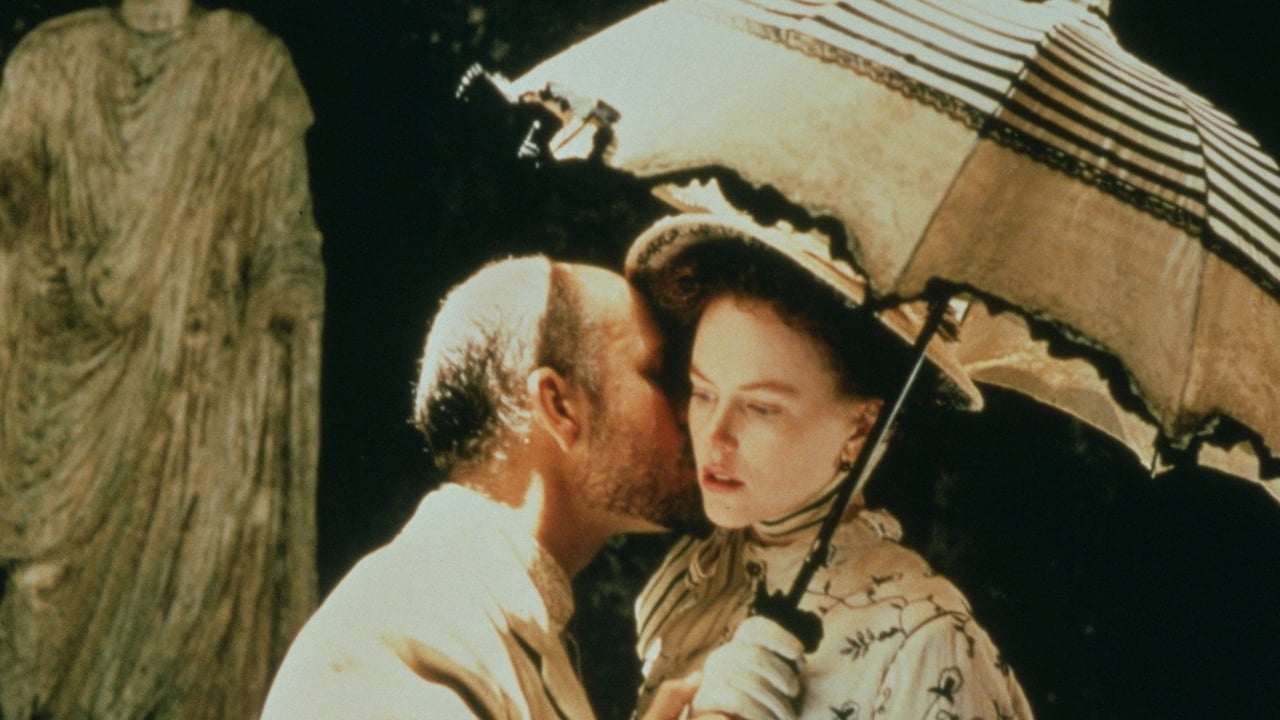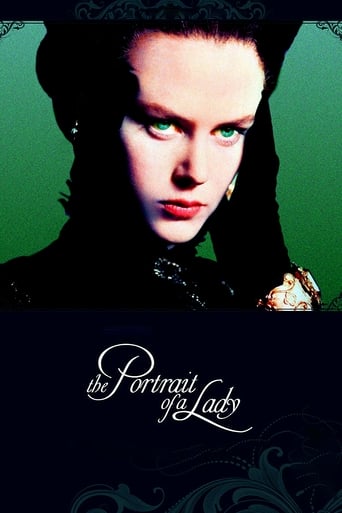



Some things I liked some I did not.
One of the best films i have seen
I cannot think of one single thing that I would change about this film. The acting is incomparable, the directing deft, and the writing poignantly brilliant.
View MoreClever and entertaining enough to recommend even to members of the 1%
View More"We'd have a good time, if only we'd stop trying to be happy." - Edith Wharton Jane Campion directs "The Portrait of a Lady", a film based on a Henry James novel of the same name. The plot? Nicole Kidman plays Isabel Archer, a young expatriate living in nineteenth century London. Though expected to be "sensible" and "marry a wealthy man", Isabel opts instead to be "free"; she travels around the world, turning down various marriage proposals along the way.Eventually Isabel meets the devious Gilbert Osmond (John Malkovich), whom she "freely" chooses to marry. This backfires; Gilbert's simply using Isabel to get at her impressive financial assets. The film's final act finds Isabel attempting to fight for the independence of Gilbert's daughter. If Isabel cannot be "free", then she will ensure that others can be.Anyone familiar with the proto-feminist novels of Edith Wharton, Jane Austen, Virginia Woolf etc will find very few surprises in "The Portrait of a Lady". This is ultimately a by-the-numbers account of 19th century upper-middle-class social circles, a sexist and classist milieu which cinema often delves into. The film's themes of "female independence" are given a subversive twist – Isabel would have been happier had she not enslaved herself to vague notions of "freedom", and had she succumbed instead to the very notions of romantic love which she cynically deems old-fashioned – but pale in comparison's to Campion's best films. Consider Campion's "Bright Star", also set in the 19th century, and "Holy Smoke", also about an adventurous expatriate, both of which handle this material in fresh and exciting ways.Unlike the vast majority of Campion's pictures, "Portrait's" screenplay wasn't written by its director. Because of this, "Portrait" lacks that distinct personal stamp which makes Campion's other films so special. "Portrait's" aesthetic is also routine, though Campion's able to conjure up a number of wonderful moments. The film's New Age prologue, in which Campion's camera captures the awakenings of 20th century women whose sexual revolution the film's 19th century characters will later be denied, is particularly wonderful. Several dream sequences and black-and-white interludes also hint at what Campion is capable of at her best. Nicole Kidman is excellent as the conflicted Isabel Archer.7.5/10 – See "The Remains of the Day", "The Story of Qiu Ju", "Red Sorghum" and "Raise the Red Lantern".
View MoreNew Zealand screenwriter and director Jane Campion's fourth feature film is an adaptation of a novel from 1881 written by American writer Henry James (1843-1916). The screenplay for this USA-England co-production which premiered at the 53rd Venice Film Festival in 1996, was written by Australian screenwriter Laura Jones. It tells the story about Isabel Archer, an independent woman from New York who after the death of her father visits her aunt Lydia and her wealthy uncle Daniel Tuchett at his estate near London. During her stay she socializes with an elder woman named Madame Serena Merle and some young men who one by one asks her for her hand in marriage. When Isabel's uncle dies, she inherits large parts of his estate and decides to travel the continent. In Florence she encounters an American expatriate named Gilbert Osmond who charms her with his knowledge and articulacy. Though having declined several proposals of marriage due to her ideals, Isabel agrees to marry Gilbert and starts a new life with him and his young daughter Pansy in Rome.This visually notable and dialog-driven period piece from the mid-1990s which draws ardent milieu depictions, is a detailed study of character about an 18th century feminist protagonist, driven by her personal choices, who seeks out and confronts her destiny while trying to maintain her integrity, but finds herself the victim of a deceitful and manipulative conspiracy. Jane Campion's second adaptation of previously written material is more of an in-depth and atmospheric character drama about a woman who is torn between her values and desires than a passionately romantic love story like "The Piano" (1993). Shot in England, USA, Turkey, Italy and Australia and acutely and distinctly directed by the brilliant filmmaker Jane Campion who has created several remarkable female character portraits since her feature film debut "Sweetie" (1989), this subtly narrated fictional tale is beautifully photographed by English-born New Zealand cinematographer Stuart Dryburgh. This lyrical epic which focuses on themes such as independence, freedom, love and betrayal, is distinguished by the prominent production and costume design by the director's frequent collaborator Janet Patterson and has a fine score by Polish composer Wojciech Kilar which reinforces the shifting atmosphere. Nicole Kidman, John Malkovich and Barbara Hershey delivers fine acting performances in this historical costume drama which gained, among other awards, the Pasinetti Award for Best Film at the 53rd Venice International Film Festival in 1996 and was nominated for Best Supporting Actress Barbara Hershey and Best Costume Design Janet Patterson at the 69th Academy Awards in 1997.
View MoreNo one can accuse Jane Campion of lack of ambition in bringing Henry James' novel to the screen, but her film is a total disaster.The audacious style that made "The Piano" so compelling and memorable is a Frankenstein's monster here, and it runs away with Campion's film. The result is incomprehensible. Actors are stranded walking around opulent sets saying lines, while Campion pulls out every trick in the book to confounding effect.Though the fact that the film is incoherent probably means that it's a good adaptation, since it was after all based on a novel by Henry James....Grade: F
View MoreI have always enjoyed period pieces, good adaptations even more so. This film, however, is really only worth a 5 - an average film - if not for the strong performances of the supporting cast. The work of Barbara Hershey and Martin Donovan in particular is stellar, raising my rating to 6 on their merit alone.Aside from those two, this film is an exercise in 'almosts' and 'not quites'. It is almost engaging enough, yet just short of drawing me completely in. It not quite makes me believe Nicole Kidman's Isabel is worthy of the love of so many. The love shown by the suitors is believable enough (again, a well acted supporting cast), I simply do not quite believe the object of that love would elicit it.Still, the film is good. It is a pity, though. It could have been great.
View More